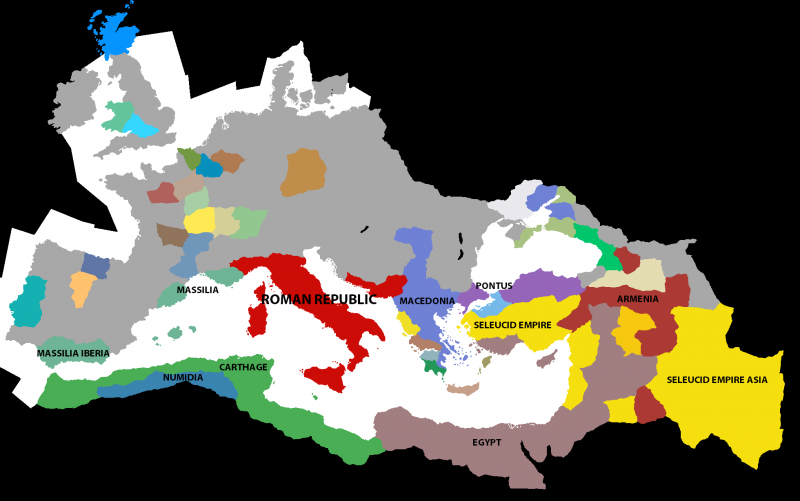Reclaiming the North
Marcus Fulvius Flaccus (16 March 500 - 22 June 511)
The fighting in Sicilia had hit its most intense at the end of the year 501. The Consul, Marcus Fulvius Flaccus, and Legate of the First Legion had just failed in his attack on Syracusae. Carthage was winning the war. It was then that the Veristii returned to northern Italia. In a mad rush these twenty thousand barbarians claimed Bononia for themselves once again.
Nobody had the courage to tell Marcus of this attack. The man needed to keep his concentration on Appius' War. If he didn't focus on the defense of the south then any moment the vastly superior Cathaginians could be rampaging across all of Italia. Instead to pacify these barbarians the Senate agreed to surrender Bononia to them. They accepted this compromise.
The Veristii were so pleased by this they sent word north. Their sister tribe known as the Lancionsi needed their own lands too. They came south bringing the sword to Liguria. It was at this time that Lucius Mamilius Vitulus was named Legate of the Third Legion. Western Sicilia was in Roman hands and the war was at last looking promising. And once again nobody said anything to Marcus. Just like with the Veristii, the Lancionsi were given the rest of northern Italia for peace.
These two barbarian tribes held the north throughout the rest of the Punic War. Nine years the Romans were shamed by a peace with barbarians. They dare not argue about it though. Then at last the Punic War was over. As the Consul returned to Rome for his triumph he was stopped just outside the walls by Marcus Fabius Buteo. Buteo had been Dux of Liguria before the Senate surrendered the lands. He now demanded Flaccus to see his province restored to him.
After being informed of what had happened in the north while he was away at war, Marcus demanded to be named Consul for the 510 election. Fearing the man nobody ran against Marcus and he was made Consul for the tenth time. He promised this would be his last time as Consul. He just could not leave the position having lost what his predecessor had gained.
Marcus wished to begin the war immediately but knew he couldn't. All three Legions were still in Carthage while the Third was still under new leadership. Those men were sent to protect the islands of Sardinia and Corsica where they could protect Rome's newest islands. The First and Gaius Aurelius Cotta's Second went to Rome's former northern border, Umbria and Etruria. Here Marcus allowed the men time to rest and to replenish their numbers. For ten years these men had fought across four islands and Carthage itself for him. The least he could do was allow them time at home.
April of 511 war was at last declared to reclaim the north. The First marched on Liguria and the Second moved against the Veristii. Marcus would ride into battle one last time to see Rome to the strongest it had ever been. He was wrong. Just as he was crossing the border into Liguria, Marcus Fulvius Flaccus died. The strain of this last campaign was to much on him.
Lucius Caecilius Metellus (22 June 511 - 16 March 512)
As Marcus' second in command, Lucius Caecilius Metellus believed it was his duty to follow Marcus. Not only as Legate of the First Legion, but he also sent a messenger to Rome telling them of Marcus' death. The letter also informed them that he was now Consul.
The messenger was given a large amount of money to take his time in reaching Rome. Time the Legions used to their benefit. The first to strike was Lucius who made quick work of Liguria. The province was captured in August 511. Only a month behind him Cotta was able to capture Bononia.
These two men had every last Veristii and Lancionsi put to the sword. Thousands upon thousands of men, women, and children were stabbed, strangled, drowned, burned alive, fed to the dogs, or simply starved to death. This went on until not a living member of either tribe dare to enter Italia again.
Lucius had reclaimed the north. Pleased with himself he went to Rome. Arriving only two days after his messenger did. His actions greatly angered the Senate. With only a few weeks until the next election the Senate let it go.
They just hoped they could find somebody in such short notice. Rome believed it was Marcus who was still Consul. Who could they get to come to Rome and best a man who claimed to have reclaimed the north, fought in the Punic War and was Marcus' own protege?


